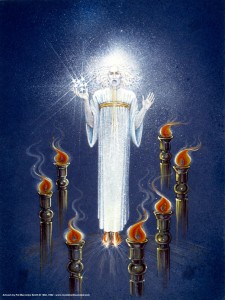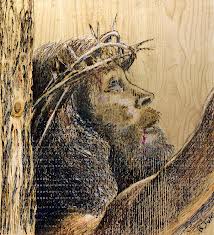John 13:20
20 “Truly, truly, I say to you, he who receives whomever I send receives Me; and he who receives Me receives Him who sent Me.”
Hermeneutics; ahh…the art and science of biblical interpretation…the sound of rational comprehension.
You can study world history with the study method’s sound principles, including your local newspaper. And you can study Milton’s Paradise Lost (so as to not get lost in it).
But the inductive study method is particularly suited for studying Scripture because of the many different audiences and messages God breathed into His text.
Context is the foundation on which the house of biblical hermeneutics rests. (See “Interpreting the Rules of Revelation,” “Apocalypse Now!” and “Hunting for Key Words the Inductive Way”). Who was being spoken to, what was being said, when and where it was said, and why it was said are the “rightly dividing” measure rods (2 Tim. 2:15) for serious Bible students. Key words, key events, general and local truth, and the anointing of God’s Spirit are all key ingredients in the interpretive process.
The rejection of these foundational principles is the reason the Mainstream Prophetic Press has flourished for so long.
Want to know what’s happening in the world? You need to read. Just because a talking head on television reports something as news doesn’t necessarily make it truth.
The same is true with prophetic news. You can take the mainstream prophetic press’ “expert positions” as gospel (as too many do without studying the matter out for themselves). Or you can study other resources to weigh the accuracy of his or her truth. There aren’t too many places you can do that, so Eschatology Today is here to help you gather some facts. Working hand in hand with Scripture and prophetic world events, Eschatology Today can equip you to study the Bible’s text, and discern God’s mind in the last days.
In this article I offer a hermeneutic look at one of our Lord Jesus Christ’s most revealing teachings, the incarnation, which tradition over the years has misinterpreted as the Rapture.
We all want to be raptured. I certainly do. But the interpretation of Jesus’ rapture teaching in John 14 shrouds the most impacting New Testament revelation Jesus disclosed in the Gospels: the indwelling of the Holy Spirit in Christ’s born-again church. Today when John 14 is taught, the Rapture is the emphasis, not this most important of all New Testament truths. Let’s take a look. You be the judge.
The Who, What, Where, When, and Why’s of Biblical Hermeneutics
 Again, I like the idea of being raptured to be home with the Lord MORE than the next. But a hermeneutic study of John 14 doesn’t prove this out. Remembering the 5 W’s of hermeneutics (who, what, when, where, why), applied to this passage: Who Jesus was speaking to in John 14 were His disciples. What was being said was His return to be the Father. When was on the eve of His crucifixion. Where, was at the Last Supper. The when and where’s of this chapter’s revelation are real interpretive zingers. Considering the local truth[1] of the setting: Jesus the Passover Lamb was celebrating Passover with His Passover people in the Passover city. Ten hours later He would die on the cross for your and my sins.
Again, I like the idea of being raptured to be home with the Lord MORE than the next. But a hermeneutic study of John 14 doesn’t prove this out. Remembering the 5 W’s of hermeneutics (who, what, when, where, why), applied to this passage: Who Jesus was speaking to in John 14 were His disciples. What was being said was His return to be the Father. When was on the eve of His crucifixion. Where, was at the Last Supper. The when and where’s of this chapter’s revelation are real interpretive zingers. Considering the local truth[1] of the setting: Jesus the Passover Lamb was celebrating Passover with His Passover people in the Passover city. Ten hours later He would die on the cross for your and my sins.
John 14:2-3
2 In my Father’s house are many mansions if it were not so, I would have told you. I go to prepare a place for you.
3 And if I go and prepare a place for you, I will come again, and receive you unto myself; that where I am, there ye may be also. (KJV)
The popular rapture teaching based on this amazing passage is commonly taught with the King James translation of “mansion,” which literally means, dwelling place. Modern expositors interpret the word as a heavenly dwelling place and suppose the Rapture as the topic of Jesus teaching. But please consider the hermeneutics of what Jesus was actually teaching.
The local truth of Jesus’ suffering that would begin the next morning at the hands of his floggers and on the cross. The suffering He would endure in the bowels of Hades as mankind’s perfect sin and burnt offering; and His resurrection that would take place three days later—were all focused issues on our Lord’s mind at that time, with one end in mind: the spiritual birth of His New Covenant Church. (Take a few minutes right now to read John chapters 12 and 13 and reconsider Christ’s Cross-headed thoughts.)
Many Mansions
There are also a number of Greek words to consider when studying John’s chapter 14 text, especially the word translated, “mansion.” The King James Version’s popular use of this word in this chapter has etched the idea of millionaire-like heavenly mansions perpetually in Christian thought. Mone[2] is the Greek word translated, which actually means, “dwelling place.” It is used twice in Jesus’ John 14 message (vvs. 2 and 23) and would quite frankly undo the “prophetically correct” rapture message in this passage if honestly interpreted in context.
John 14:2
2 “In My Father’s house are many dwelling places (mone); if it were not so, I would have told you; for I go to prepare a place for you.
John 14:20
20 “In that day you shall know that I am in My Father, and you in Me, and I in you.
John 14:23
23 Jesus answered and said to him, “If anyone loves Me, he will keep My word; and My Father will love him, and We will come to him, and make Our abode (mone) with him.
The literal interpretation of verse 23 reveals the Father, Son, and Holy Spirit (the Trinity, we, would come to us; NOT us going into heaven to Him. Verse 20 says in that day we would know that they would live in us, on earth.
In My Father’s House…
 Hermeneutics also forces us to stop and look at the where of these dwelling places. Jesus located them in “My Father’s House.” The Greek word translated house, oikia, in this passage means a residence, and by implication a family. Understanding the meaning, therefore, of three of the four key words in this key gospel passage: “mansion”: (mone); “dwelling place”; and “house”: (oikos) “a family, a residence”; you could honestly transliterate verse 2 like this:
Hermeneutics also forces us to stop and look at the where of these dwelling places. Jesus located them in “My Father’s House.” The Greek word translated house, oikia, in this passage means a residence, and by implication a family. Understanding the meaning, therefore, of three of the four key words in this key gospel passage: “mansion”: (mone); “dwelling place”; and “house”: (oikos) “a family, a residence”; you could honestly transliterate verse 2 like this:
2 “In My Father’s family are many dwelling places; if it were not so, I would have told you; for I go to prepare a place for you.
I Go to Prepare A Place…
The third key word in John 14:3, “place,” topos, can mean “a spot, location” or figuratively, condition, opportunity.” Demonstrated by the worship practice in the Hebrew tabernacle, there was a place for man in God’s presence, one time annually (Lev. 16; Heb 9:7). Taking into account the local truth of this passage, a new place had to be prepared for mankind’s restoration into God’s presence, and Jesus was on His way to provide it.
Heb 10:19-26
19 Since therefore, brethren, we have confidence to enter the holy place by the blood of Jesus,
20 by a new and living way which He inaugurated for us through the veil, that is, His flesh,
21 and since we have a great priest over the house of God,
22 let us draw near with a sincere heart in full assurance of faith, having our hearts sprinkled clean from an evil conscience and our bodies washed with pure water.
Hagion the neuter of hagios; a sacred thing (i.e. spot) is the word used in this passage. It is not the same Greek word used in John 14, but is translated place in the NAS in context of Jesus’ redemptive ministry.
The revelation contained in this invaluable book also sheds some light on the concept of God’s oikos house: 
Hebrews 3:6
6 but Christ was faithful as a Son over His house whose house we are, if we hold fast our confidence and the boast of our hope firm until the end.
Understanding this great blood redemption truth (Eph 2:13,18) can confirm and also clarify the where of Jesus’ answer to Peter’s question in John 13:36:
36 Simon Peter said to Him, “Lord, where are You going?” Jesus answered, “Where I go, you cannot follow Me now; but you shall follow later.”
Where was Jesus about to go? To the Cross. In a few hours He would be sweating blood in agony over its coming. The crucifying acceptance of its life-giving salvation must precede the coming of His Spirit in every repentant heart. It is the place where self must die before God imparts life, and Peter would soon face it.
But again, the real kicker in rightly dividing this passage is the word mone; “dwelling place.” Jesus was still talking in context the second time He used it when completing His “in that day” prophecy in verses 20-23.
John 14:20
20 “In that day you shall know that I am in My Father, and you in Me, and I in you.
Again, notice Jesus’ declaration in verse 20, and the action in verse 23. In “that day” Jesus was looking toward in verse 20 the disciples would know Jesus was in the Father, and the disciples would be in Jesus, and Jesus in them.
John 14:20
20 “I am in My Father, and you in Me, and I in you.”
 The coming or going in verse 23 is done by Jesus and the Father, to make their mone (dwelling place, mansion, abode) in those who loved Jesus and kept His word. Why the New American Standard version scholars didn’t translate mone either “dwelling place” or “abode” consistently in vvs. 2 and 23 is beyond me. What is consistent is the prophecy of a dwelling place located in the believer where Jesus and the Father would take up residence. (Do a “I, Me, He” key word search in John 14 and your mind will boggle as you see how easily Jesus went from first, to second, to third person singular in describing the indwelling presence of the Trinity.)
The coming or going in verse 23 is done by Jesus and the Father, to make their mone (dwelling place, mansion, abode) in those who loved Jesus and kept His word. Why the New American Standard version scholars didn’t translate mone either “dwelling place” or “abode” consistently in vvs. 2 and 23 is beyond me. What is consistent is the prophecy of a dwelling place located in the believer where Jesus and the Father would take up residence. (Do a “I, Me, He” key word search in John 14 and your mind will boggle as you see how easily Jesus went from first, to second, to third person singular in describing the indwelling presence of the Trinity.)
This is incarnation (indwelling), not rapture (second coming), talk. And there’s even more in succeeding chapters that strengthens this local truth. Continuing His incarnation teaching in chapter 15, Jesus used the parabolic language of a vineyard.
I’m a Vine, You’re Branches
John 15:1,2
1 “I am the true vine, and My Father is the vinedresser.
2 “Every branch in Me that does not bear fruit, He takes away; and every branch that bears fruit, He prunes it, that it may bear more fruit.
“Okay men,” He said as they walked on in John 15 to their campsite for the night. “I know this is a hard teaching for you right now. So look at it this way: The Father is a farmer, I’m His vine, and you are vine branches. Without our life presence living in you, you will wither and die, like a dead, crumpled branch. Those of you who live, get ready to be pruned, because in you, My Father and I will perform and continue My work.
In chapter 16 Jesus prophesied the coming of His Holy Spirit.
John 16:13
13 “But when He, the Spirit of truth, comes, He will guide you into all the truth; for He will not speak on His own initiative, but whatever He hears, He will speak; and He will disclose to you what is to come.”
Then, finally, in chapter 17, He prayed for our joint incarnation with the Father as one with them. Notice within the context of this prayer how Jesus didn’t pray to take His disciples out of the world to be with Him in heaven, but to empower them to live victoriously on earth.
John 17:15,21
15 “I do not ask You to take them out of the world, but to keep them from the evil one. 21…that they may all be one; even as You, Father, are in Me and I in You, that they also may be in Us, so that the world may believe that You sent Me.

The concept of Christ’s body enjoining many human members is “the” astounding revelation of the New Testament Church. Without Paul’s writings we wouldn’t understand it. Without Jesus’ life and teaching, we couldn’t apprehend it. Was Jesus really interested in an event He knew would take place two thousand years from that time in when He was preparing to suffer the Cross to give birth to His church? Or was He concerned with the culmination of His first coming that would give spiritual birth to His church?
You decide.
Eschatology Today publisher, Mark Norris, M.A.

